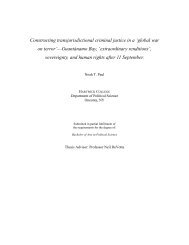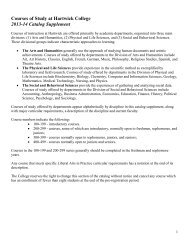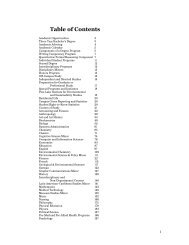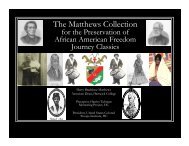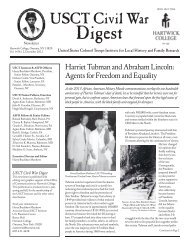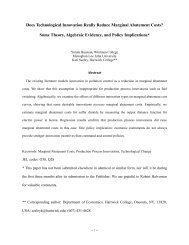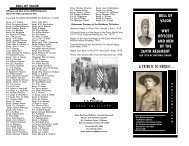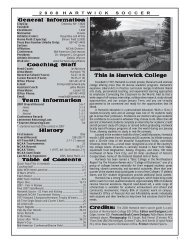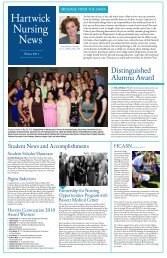Table of Contents - Hartwick College
Table of Contents - Hartwick College
Table of Contents - Hartwick College
Create successful ePaper yourself
Turn your PDF publications into a flip-book with our unique Google optimized e-Paper software.
210 Early Modern Europe (3 credits) This course first examines the<br />
birth <strong>of</strong> modern Europe in the Italian Renaissance. It then considers the<br />
religious and political forces, which shredded the fabric <strong>of</strong> Christian unity<br />
and ushered in an age <strong>of</strong> religious and dynastic warfare that produced the<br />
modern constitutional and absolutist states. The survey will then examine<br />
the cultural, economic and political impact <strong>of</strong> overseas exploration, the<br />
Scientific Revolution and the Enlightenment. The survey culminates with<br />
a close examination <strong>of</strong> the French and Industrial Revolutions. (WHS)<br />
212 Europe, 1815-1914 (3 credits) Pivotal events in 19 th century<br />
European History, including: Industrialization and its consequences;<br />
political revolutions and ideologies: nationalism; the labor question; and<br />
cultural and intellectual movements such as Romanticism. Attention will<br />
also be devoted to the prevailing cultural assumptions about race, class<br />
and gender which defined Europeans’ sense <strong>of</strong> identity and their place in<br />
the world, as well as scientific and economic theories which were used to<br />
justify European imperialism. (WHS)<br />
213 Europe in 20th Century (3 credits) Major events in 20 th century<br />
European history, including the origins and catastrophic nature <strong>of</strong> World<br />
War I; the Russian revolution and Communist and Fascist challenges to<br />
strained democratic societies; economic depression; World War II and the<br />
Holocaust; the Cold War and the eclipse <strong>of</strong> Europe by the Superpowers;<br />
the loss <strong>of</strong> colonial empires; reform and revolution in Eastern and<br />
Western Europe, and the gradual formation <strong>of</strong> a more cooperative<br />
European community; and emerging challenges <strong>of</strong> globalization in the 21 st<br />
century (economic conflict, immigration, sustainable development).<br />
(WHS)<br />
215 Tudor-Stuart History (3 credits) A survey <strong>of</strong> Tudor-Stuart English<br />
history (ca. 1485-1688), one <strong>of</strong> the most important periods <strong>of</strong> Western<br />
European history as it shaped much <strong>of</strong> English society into the present<br />
even as it served as a baseline for much <strong>of</strong> what would be reinforced,<br />
continued, or altered as the English confronted the complexities <strong>of</strong> the<br />
“New World.”<br />
218 France – Historical Origins and Contemporary Society (1<br />
credit) Preparatory course in second half <strong>of</strong> fall semester for January<br />
Term course Hist 219, Imagined Communities in France.<br />
219 Imagined Communities in France (3 credits) An interactive,<br />
cross-cultural study <strong>of</strong> the historical construction <strong>of</strong> the French sense <strong>of</strong><br />
identity and the different forms <strong>of</strong> “community” (national, historical,<br />
cultural, and religious) in which the identity <strong>of</strong> being “French” is either<br />
invented or challenged. France will serve as a test case for some <strong>of</strong> the<br />
broader issues in the formation <strong>of</strong> community throughout Europe. To do<br />
this, students will travel to several sites-Paris, the capital city and heart<br />
France as a national community; the chateaux <strong>of</strong> the Loire Valley, rich<br />
with the legacy <strong>of</strong> the Renaissance and the consolidation <strong>of</strong> the French<br />
kingdom; Normandy, which served as a springboard for the Norman<br />
conquest <strong>of</strong> England as well as the Allied invasion <strong>of</strong> France in WWII;<br />
Strasbourg, on the border between France and Germany and home to the<br />
European Parliament; and Marseille, Arles, and Avignon, three <strong>of</strong> the<br />
oldest cities in France, each strongly influenced in different ways by their<br />
ties to Rome. Prerequisite: HIST 218. (WHS)<br />
146



